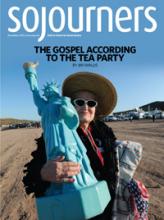Everyone knows the story of David and Goliath: Though it at first appears to be a losing battle, the good guy wins, the one with the principled stance. We love the story because, somewhere deep within, we want to believe that might does not equal right. We want to believe that Joshua can fight the battle of Jericho and win, and so can we. We want to believe that even in Washington, where very often money equals power, good bills can sometimes pass despite enormous political pressure and money poured in by opponents to try to stop them.
The influx of money to get elected officials' votes -- money for lobbyists, PR, advertisements, and campaign contributions -- is staggering. This flood of cash can encourage a bill's opponents in Congress to at best subvert the intent of legislation, and at worst simply tell lies about what a particular bill would do. And since the Supreme Court's "Citizens United" decision this January, there is no limit to the money that corporations can spend to help elect politicians sympathetic to their interests. Are you as tired as I am of political advertising that places blame, demonizes the other, and talks about everything except the real issues?
The effort to prevent corporations from financing candidates to do their bidding can feel like a futile battle -- but sometimes even money and influence are not enough to stop positive legislation. The financial reform bill passed in July was a good example. The financial services industry did everything it could to oppose the bill, but after a long, hard fight, advocates for consumers won. Because of that, our financial system is more sound, secure, and protective of consumers. (Advocates for this bill are continuing to do battle with the financial services industry as the rules to implement the new law are being written.)
Read the Full Article
